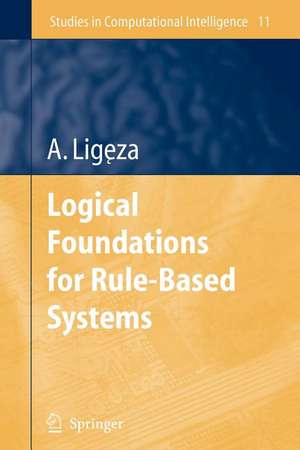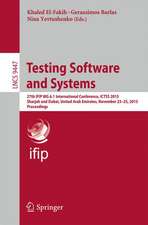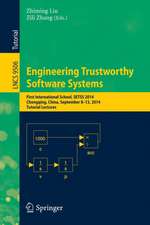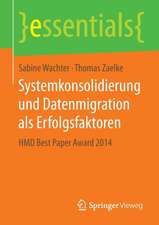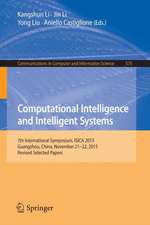Logical Foundations for Rule-Based Systems: Studies in Computational Intelligence, cartea 11
Autor Antoni Ligezaen Limba Engleză Paperback – 12 feb 2010
| Toate formatele și edițiile | Preț | Express |
|---|---|---|
| Paperback (1) | 946.24 lei 6-8 săpt. | |
| Springer Berlin, Heidelberg – 12 feb 2010 | 946.24 lei 6-8 săpt. | |
| Hardback (1) | 952.26 lei 6-8 săpt. | |
| Springer Berlin, Heidelberg – 10 ian 2006 | 952.26 lei 6-8 săpt. |
Din seria Studies in Computational Intelligence
- 20%
 Preț: 449.37 lei
Preț: 449.37 lei - 20%
 Preț: 1158.26 lei
Preț: 1158.26 lei - 20%
 Preț: 986.66 lei
Preț: 986.66 lei - 20%
 Preț: 1452.76 lei
Preț: 1452.76 lei - 20%
 Preț: 168.78 lei
Preț: 168.78 lei - 20%
 Preț: 1291.10 lei
Preț: 1291.10 lei - 18%
 Preț: 1112.30 lei
Preț: 1112.30 lei - 20%
 Preț: 565.39 lei
Preț: 565.39 lei - 20%
 Preț: 649.28 lei
Preț: 649.28 lei - 20%
 Preț: 1047.73 lei
Preț: 1047.73 lei - 20%
 Preț: 1578.96 lei
Preț: 1578.96 lei - 20%
 Preț: 643.50 lei
Preț: 643.50 lei - 20%
 Preț: 657.49 lei
Preț: 657.49 lei - 20%
 Preț: 993.28 lei
Preț: 993.28 lei - 20%
 Preț: 990.80 lei
Preț: 990.80 lei - 20%
 Preț: 989.96 lei
Preț: 989.96 lei - 20%
 Preț: 1165.69 lei
Preț: 1165.69 lei - 20%
 Preț: 1444.52 lei
Preț: 1444.52 lei - 20%
 Preț: 1041.96 lei
Preț: 1041.96 lei - 20%
 Preț: 1047.73 lei
Preț: 1047.73 lei - 20%
 Preț: 1046.06 lei
Preț: 1046.06 lei - 18%
 Preț: 2500.50 lei
Preț: 2500.50 lei - 20%
 Preț: 989.13 lei
Preț: 989.13 lei - 20%
 Preț: 1165.69 lei
Preț: 1165.69 lei - 20%
 Preț: 1164.05 lei
Preț: 1164.05 lei - 20%
 Preț: 1042.79 lei
Preț: 1042.79 lei - 20%
 Preț: 1460.19 lei
Preț: 1460.19 lei - 18%
 Preț: 1403.52 lei
Preț: 1403.52 lei - 18%
 Preț: 1124.92 lei
Preț: 1124.92 lei - 20%
 Preț: 1039.47 lei
Preț: 1039.47 lei - 20%
 Preț: 1008.11 lei
Preț: 1008.11 lei - 20%
 Preț: 1045.25 lei
Preț: 1045.25 lei - 20%
 Preț: 1275.42 lei
Preț: 1275.42 lei - 20%
 Preț: 1040.32 lei
Preț: 1040.32 lei - 20%
 Preț: 988.32 lei
Preț: 988.32 lei - 20%
 Preț: 1169.79 lei
Preț: 1169.79 lei - 20%
 Preț: 1162.37 lei
Preț: 1162.37 lei - 20%
 Preț: 1059.26 lei
Preț: 1059.26 lei - 20%
 Preț: 1164.05 lei
Preț: 1164.05 lei - 20%
 Preț: 1166.52 lei
Preț: 1166.52 lei - 20%
 Preț: 1459.38 lei
Preț: 1459.38 lei - 18%
 Preț: 1005.74 lei
Preț: 1005.74 lei - 20%
 Preț: 997.38 lei
Preț: 997.38 lei - 20%
 Preț: 1055.94 lei
Preț: 1055.94 lei - 20%
 Preț: 1284.47 lei
Preț: 1284.47 lei - 20%
 Preț: 994.08 lei
Preț: 994.08 lei - 20%
 Preț: 1048.72 lei
Preț: 1048.72 lei - 20%
 Preț: 1066.02 lei
Preț: 1066.02 lei - 20%
 Preț: 943.78 lei
Preț: 943.78 lei - 20%
 Preț: 1173.10 lei
Preț: 1173.10 lei
Preț: 946.24 lei
Preț vechi: 1153.95 lei
-18% Nou
Puncte Express: 1419
Preț estimativ în valută:
181.07€ • 193.62$ • 150.97£
181.07€ • 193.62$ • 150.97£
Carte tipărită la comandă
Livrare economică 18 aprilie-02 mai
Preluare comenzi: 021 569.72.76
Specificații
ISBN-13: 9783642067099
ISBN-10: 3642067093
Pagini: 332
Ilustrații: XX, 309 p. 33 illus.
Dimensiuni: 155 x 235 x 17 mm
Greutate: 0.47 kg
Ediția:Softcover reprint of hardcover 2nd ed. 2006
Editura: Springer Berlin, Heidelberg
Colecția Springer
Seria Studies in Computational Intelligence
Locul publicării:Berlin, Heidelberg, Germany
ISBN-10: 3642067093
Pagini: 332
Ilustrații: XX, 309 p. 33 illus.
Dimensiuni: 155 x 235 x 17 mm
Greutate: 0.47 kg
Ediția:Softcover reprint of hardcover 2nd ed. 2006
Editura: Springer Berlin, Heidelberg
Colecția Springer
Seria Studies in Computational Intelligence
Locul publicării:Berlin, Heidelberg, Germany
Public țintă
ResearchCuprins
Logical Foundations of Rule-Based Systems.- Propositional Logic.- Predicate Calculus.- Attribute Logic.- Resolution.- Dual Resolution.- Principles of Rule-Based Systems.- Basic Structure of Rule-Based Systems.- Rule-Based Systems in Propositional Logic.- Rule-Based Systems in Attributive Logic.- Rule-Based Systems in First-Order Logic.- Inference Control in Rule-Based Systems.- Logic Programming and Prolog.- Verification of Rule-Based Systems.- Principles of Verification of Rule-Based Systems.- Analysis of Redundancy.- Analysis of Indeterminism and Inconsistency.- Reduction of Rule-Based Systems.- Analysis of Completeness.- Design of Rule-Based Systems.- An Introduction to Design of Rule-Based Systems.- Logical Foundations: the ?-Trees Based Approach.- Design of Tabular Rule-Based Systems with XTT.- Design Example: Thermostat.- Concluding Remarks.
Recenzii
From the reviews of the second edition:
"Rule-Based Systems (RBSs) constitute a powerful tool for specification of knowledge in design and implementation of knowledge-based systems … . The aim of this book is to present RBSs from the logical perspective … . The special feature of this book on RBSs is that … the present RBS monograph follows a unitary line of formalism … . The book is addressed to researchers, students and engineers interested in RBS technology … a source of inspiration for knowledge engineering theory and practice." (Neculai Cureanu, Zentralblatt MATH, Vol. 1095 (21), 2006)
"Rule-Based Systems (RBSs) constitute a powerful tool for specification of knowledge in design and implementation of knowledge-based systems … . The aim of this book is to present RBSs from the logical perspective … . The special feature of this book on RBSs is that … the present RBS monograph follows a unitary line of formalism … . The book is addressed to researchers, students and engineers interested in RBS technology … a source of inspiration for knowledge engineering theory and practice." (Neculai Cureanu, Zentralblatt MATH, Vol. 1095 (21), 2006)
Textul de pe ultima copertă
The book presents logical foundations for rule-based systems, as seen by the Author. An attempt has been made to provide an in-depth discussion of logical and other aspects of such systems, including languages for knowledge representation, inference mechanisms, inference control, design and verification. The ultimate goal was to provide a deeper theoretical insight into the nature of rule-based systems and put together the most complete presentation including details so frequently skipped in typical textbooks. The main parts present material on: • logical foundations of rule-based systems (Part I); • principles of rule-based systems structures, knowledge representation languages, inference and inference control (Part II); • verification of formal properties of rule-based systems (Part III); • design methodology for efficient development of such systems (Part IV).
The book may be useful to potentially wide audience, but it is aimed at providing specific knowledge for graduate, post-graduate and Ph.D. students, as well as knowledge engineers and research workers involved in the domain of AI. It also constitutes a summary of the Author’s research and experience gathered through several years of his research work.
The book may be useful to potentially wide audience, but it is aimed at providing specific knowledge for graduate, post-graduate and Ph.D. students, as well as knowledge engineers and research workers involved in the domain of AI. It also constitutes a summary of the Author’s research and experience gathered through several years of his research work.
Caracteristici
Very good exposition of logical approaches to model and handle rule based representation in intelligent systems Includes supplementary material: sn.pub/extras
